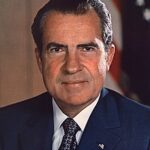The Watergate Break-In Decision
The Watergate scandal began with a seemingly minor break-in on June 17, 1972. Five men were caught burglarizing the Democratic National Committee headquarters at the Watergate complex. President Nixon’s administration initially dismissed the incident as a “third-rate burglary.” However, Nixon made the fateful decision to authorize a comprehensive cover-up. ⚠️ This choice would ultimately destroy his presidency and reshape American politics.
The Cover-Up Strategy
Nixon and his advisors implemented a multi-layered obstruction strategy. They used CIA resources to halt the FBI investigation. The administration paid hush money to the burglars and their families. High-ranking officials committed perjury before Congress and grand juries. 📊 White House recordings later revealed Nixon’s direct involvement in these illegal activities.
Political Calculations Behind the Decision
Nixon feared the break-in investigation would expose broader campaign violations. His re-election committee had engaged in numerous “dirty tricks” against Democratic opponents. 💰 The administration had also accepted illegal corporate campaign contributions. Nixon believed a cover-up would protect both his presidency and his 1972 re-election chances.
Impact:
Immediate Political Consequences
The Watergate scandal investigation gradually exposed the Nixon administration’s crimes. Bob Woodward and Carl Bernstein’s Washington Post reporting kept the story alive. The Senate Watergate Committee hearings captivated the nation in 1973. 🔥 Public trust in government plummeted as evidence mounted against Nixon. The House Judiciary Committee voted to impeach Nixon on three charges in July 1974.
Constitutional Crisis and Resignation
Nixon’s refusal to release White House tapes created a constitutional standoff. The Supreme Court unanimously ordered him to surrender the recordings in July 1974. The “smoking gun” tape revealed Nixon’s early involvement in the cover-up. 📉 Facing certain impeachment and removal, Nixon became the first president to resign on August 9, 1974.
Long-term Effects on American Democracy
The Watergate scandal fundamentally altered American political culture. Congress passed new ethics laws and campaign finance reforms. Investigative journalism gained unprecedented prestige and influence. 🌍 Public cynicism toward government increased dramatically and persisted for decades. The scandal established precedents for holding presidents accountable for criminal behavior. Presidential power faced new legal and political constraints that continue today.
